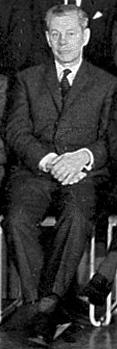Ralph Kekwick facts for kids
Ralph Ambrose Kekwick (born November 11, 1908, died January 17, 2000) was a British scientist known as a biochemist. He did very important work on human plasma, which is the liquid part of our blood. He found ways to separate plasma into different parts, and he was the first to create something called Factor VIII, which is crucial for blood to clot properly.
Contents
Early Life and School
Ralph Kekwick grew up in Leytonstone, England. His father worked in a shipping company, and his mother was a teacher. Ralph was the youngest of three children.
When he was 11, Ralph won a scholarship to Leyton County High School for boys. His older brother studied chemistry at University College London (UCL), and his stories about science really inspired Ralph.
Ralph started at UCL in 1925, just before his 17th birthday. He studied chemistry and earned a top degree in 1928.
Career and Discoveries
Starting in Science (1920s-1930s)
After finishing his first degree, Ralph decided he wanted to study biochemistry, which is the chemistry of living things. He stayed at UCL and began working on proteins, like the ones found in a hen's egg.
In 1931, Ralph received a special scholarship called the Harkness Fellowship. This allowed him to spend two years studying in the United States. He then returned to UCL as a lecturer.
From 1935 to 1937, he spent time in Uppsala, Sweden, working with a famous scientist named Theodor Svedberg. Svedberg had won a Nobel Prize in Chemistry for his work with a machine called an ultracentrifuge. This machine spins things incredibly fast to separate tiny particles, like proteins, based on their size and weight. Ralph helped set up a similar machine at the Lister Institute of Preventive Medicine in London, where he started working in 1937.
During this time, Ralph published many scientific papers about how proteins behave. In 1941, he earned a higher degree called a DSc from London University for his important contributions to understanding proteins.
Wartime Work (1940s)
When World War II began in 1939, Ralph was in the USA with his wife and young daughter. He returned to the UK, but his family stayed in the USA until 1944 for safety.
Back in London, Ralph continued his research. During the war, there was a big need for blood plasma and serum for transfusions to help injured soldiers. However, stored human serum would sometimes become cloudy, making it look like it was contaminated. Ralph found a way to make a clear, stable product that could be safely used.
To avoid the bombing in London, Ralph moved his work to a different location in Carshalton. There, he helped produce large amounts of treated human serum and plasma, which were used to save many lives during the war. He continued to work on separating different parts of human plasma.
Later Career and Achievements (1950s-Retirement)
As the demand for blood products grew, a new laboratory was built. In 1952, Ralph became a Reader in Biophysics at the University of London.
One of his most important achievements came in 1957. He successfully produced the first effective concentrate of human Factor VIII. This was a huge breakthrough because Factor VIII is essential for blood clotting, and people with hemophilia (a condition where blood doesn't clot normally) often lack it. This discovery helped many patients.
For his amazing contributions to blood transfusions, Ralph received the Oliver Memorial Award. In 1966, he became a full Professor at the University of London and was also elected a Fellow of the Royal Society (FRS), which is a very high honor for scientists in the UK.
Ralph retired in 1971. He passed away in 2000.
Personal Life
Ralph met his first wife, Barbara Stone, in New York in the 1930s, and they married in 1933. She became unwell after an operation, and he retired to care for her. She died 18 months later. In 1974, he married Margaret Mackay, a former colleague from the Lister Institute. She sadly passed away in 1982.
 | William M. Jackson |
 | Juan E. Gilbert |
 | Neil deGrasse Tyson |


